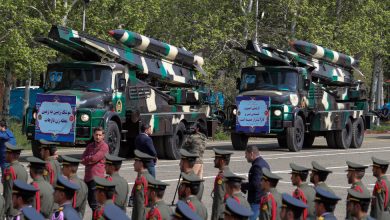With a Simple Funeral, South Africa Bids Farewell to Desmond Tutu

CAPE TOWN — In an almost empty cathedral, with an unvarnished, rope-handled coffin placed before the altar, South Africa said farewell on Saturday to Archbishop Desmond M. Tutu with the simplicity that he had planned.
Archbishop Tutu’s death last Sunday at age 90 was followed by a week of mourning, as the world remembered his powerful role both in opposing apartheid and in promoting unity and reconciliation after its defeat.
But his funeral in a rain-soaked Cape Town, where pandemic regulations limited attendance to 100 and discouraged crowds outside, was far more subdued than the packed stadiums and parade of dignitaries that mourned South Africa’s other Nobel Peace Prize laureate, Nelson Mandela. It was exactly what the archbishop had wanted.
A hymn sung in his mother tongue, Setswana; Mozart’s “Laudate Dominum”; and a sermon delivered by an old friend were all part of what Archbishop Tutu designed for his requiem Mass, celebrated at St. George’s Cathedral. There would be no official speeches beyond the eulogy, and the only military presence allowed at the funeral of a man who once said, “I am a man of peace, but not a pacifist,” came when an officer brought South Africa’s national flag to be handed to his widow, Nomalizo Leah Tutu.
The coronavirus pandemic further scaled down proceedings. With a limited guest list, the only international heads of state in attendance had a close relationship with the archbishop, like King Letsie III of Lesotho, who spent time with the Tutu family as a child at a boarding school in England. A former president of Ireland, Mary Robinson, read one of the prayers during the requiem Mass. With singing discouraged in closed spaces to reduce the spread of the virus, the choir performed in an adjacent hall.
“Desmond was not on some crusade of personal aggrandizement or egotism,” said the friend who delivered the sermon, Michael Nuttall, who as bishop of Natal in the 1980s and 1990s became known as “Tutu’s No. 2.” He described their relationship, as the first Black archbishop of Cape Town and his white deputy, as a precursor “of what could be in our wayward, divided nation.”
Archbishop Tutu “loved to be loved,” though, recalled Bishop Nuttall, and this was the enduring image of the diminutive man in flowing clerical robes: a dynamic leader who joked and scolded with equal gusto.
The activist archbishop was at the forefront of the struggle against apartheid. Outside South Africa, he campaigned for international sanctions as he preached about the injustices that Black South Africans suffered under the segregationist regime. At home, he presided over dozens of funerals of young activists killed as the country’s townships resembled a war zone in the final years of apartheid.
After the country’s first democratic election in 1994, he led the Truth and Reconciliation Commission and christened the “new” South Africa the “rainbow nation” as he tried to shepherd its citizens toward national healing. In the nearly three decades since the end of apartheid, he continued to speak out against the corruption and inequality that sullied that ideal.
“When he first spoke about us as a ‘rainbow nation,’ South Africa was a different place and were going through a very difficult time,” President Cyril Ramaphosa said in his eulogy. “He has left us at another difficult time in the life of our nation.”
In the week leading up to the funeral, those who were close with Archbishop Tutu said that as he became increasingly frail, they saw a man distressed by South Africa’s enduring social and economic inequality. In the past two years, the coronavirus pandemic and resulting lockdowns have further exacerbated poverty, bringing unemployment to record levels.
Under Covid-19 restrictions, at a public viewing site erected in the Grand Parade, Cape Town’s main public square, barely 100 people gathered to watch the service on a big screen. Those who braved the rain said they wanted to say goodbye to a “great man,” like Laurence and Joslyn Vlotman, who brought an umbrella and small camp stool. But many, like Meg Jordi, sat on the ground.
Michael Jatto, a British national on vacation in South Africa from England, took his two daughters to the square to learn about the archbishop — “for us as Africans, for our children to see a great man being shown in a positive light.”
For many South Africans who attended Christian and interfaith services in the days leading up to the funeral, there was a collective sense that South Africa had lost its moral compass. Some, though, found hope in the renewed focus on Archbishop Tutu’s life and legacy.
“I feel we’ve gained in the way that the country, the government, the church has magnified him and held him up,” said Nikki Lomba, who watched from behind a barrier with her mother, Brita Lomba, as the archbishop’s coffin was driven away in a hearse. “I feel we’ve gained more hope, and at a very pivotal moment learned a lot in his passing.”
Zanele Mji contributed reporting.





